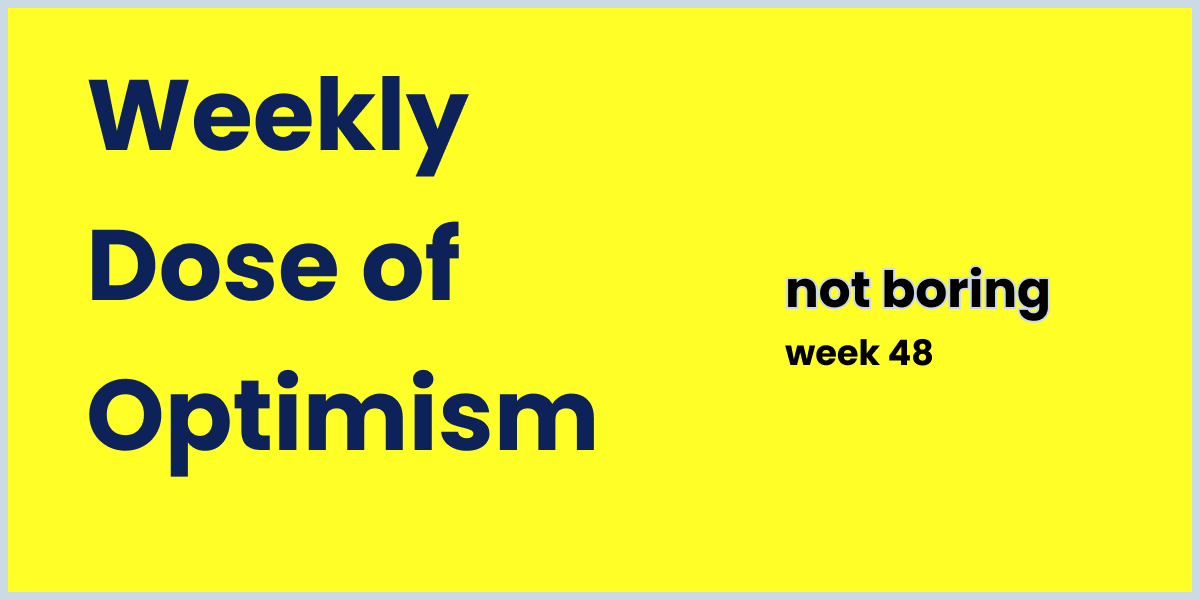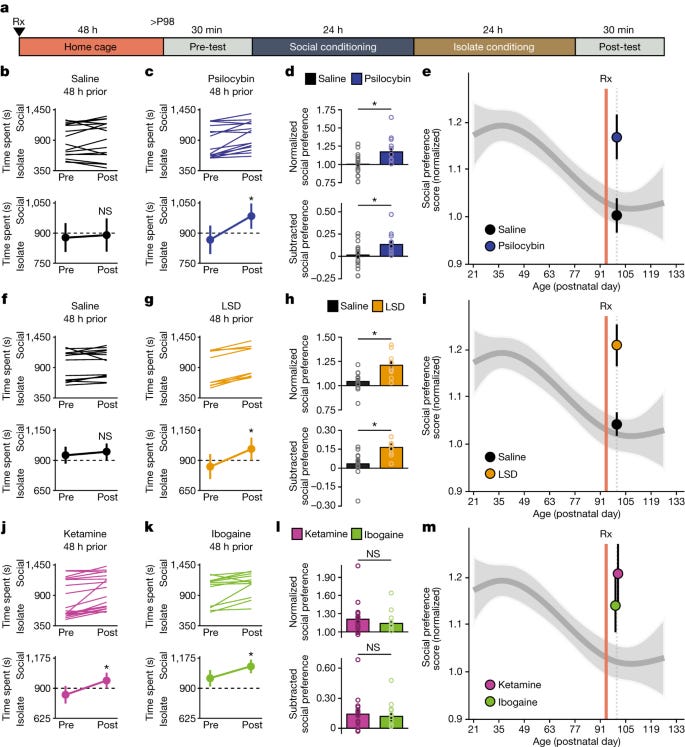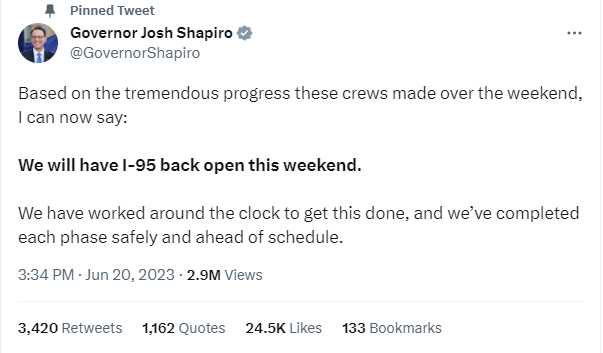

Weekly Dose of Optimism #48
source link: https://www.notboring.co/p/weekly-dose-of-optimism-48
Go to the source link to view the article. You can view the picture content, updated content and better typesetting reading experience. If the link is broken, please click the button below to view the snapshot at that time.

Weekly Dose of Optimism #48
Two Biases, Compounding Optimism, Cultivated Meat, Social Reward Shrooms, I-95
Hi friends 👋,
Happy Friday and welcome back to our 48th Weekly Dose of Optimism.
During a week in which the entire world is suffered from second-hand anxiety and claustrophobia, we’re thankful we can deliver a slate full of stories that will l keep you a bit more optimistic.
Let’s get to it.
The Weekly Dose is brought to you by… Ezra
Ezra is on a mission to detect cancer early for everyone in the world. The company offers full-body MRI scans in order to catch cancer earlier to increase the odds of beating it.
Packy recently wrote a 10,000 word essay on his experience with Ezra, and why he think this company is so important. Thankfully his scan revealed he was cancer free. We were so excited to see that the essay drove over 350 Not Boring readers to signup for their Ezra scan.
There’s really no downside to getting a scan. Clean scan = peace of mind. Early cancer detection = increased odds of beating it.
You can get your scan, now $250 off using code PACKY250:
(1) Your Brain Has Tricked You Into Thinking Everything Is Worse
Adam Mastroianni for the New York Times
When you put these two cognitive mechanisms together, you can create an illusion of decline. Thanks to biased exposure, things look bad every day. But thanks to biased memory, when you think back to yesterday, you don’t remember things being so bad. When you’re standing in a wasteland but remember a wonderland, the only reasonable conclusion is that things have gotten worse.
Ever wonder why politicians promise to restore some previous period of glory? It’s a tactic as old as politics, and it’s still effective. Trump promised to “Make America Great Again.” Then Biden came in and proclaimed that “America is Back.” Humans are biased to think that things used to be better and that everything is worse today than it was yesterday. And everyone from politicians, to marketers, to your parents known how to play on this bias.
But most everyone's thinking is wrong. We are not in the midst of some never ending moral decline. Progress hasn’t really stagnated. It is the best time in human history to be born. So why are people so susceptible to this line of pessimistic thinking?
Biased Exposure: People predominantly encounter and pay attention to negative information about others — mischief and misdeeds make the news and dominate our conversations. If it bleeds it reads!
Biased memory: The negativity of negative information fades faster than the positivity of positive information. I was a wreck the first time I got dumped, but now I barely remember anything about that relationship. Yet, I could tell you the minute details of my first date with my current girlfriend.
Taken together, these two biases mean that things look bad everyday, but when you look back you don’t remember things being so bad.
So why are we sharing this? Well, knowing we have a problem is the first step. We’re naturally biased towards pessimism. Optimism takes work.
Morgan Housel for Collaborative Fund
Small ideas mixing and compounding into big ones – that’s what really drives the world. I think part of the reason pessimism is so much easier and more common than optimism is that compound growth is not intuitive.
Morgan Housel, in his most recent essay, explains why optimism takes work. It’s not intuitive. It’s not intuitive because the underlying driver of optimism is compound growth, and compound growth is hard to wrap your head around.
Any story we write about in the Weekly Dose of Optimism is likely the result of hundreds of small ideas, discoveries, or research papers, compounding on top of each other for hundreds of years. OpenAI doesn’t happen with out Daniel Faraday demonstrating the principle of electromagnetic induction in 1831, or the millions of other advancements in the subsequent 191 years.
No matter how smart you are, you simply can’t predict this stuff. So how can you be optimistic about a future that you can’t predict? It goes back to knowing our limitations. Optimism takes work. It’s knowing that we can’t predict the future. It’s knowing that small ideas compound. And it’s believing that, if history is any indication, those small ideas will compound into progress-driving, world-changing ideas.
(3) FDA Completes First Pre-Market Consultation for Human Food Made Using Animal Cell Culture Technology
From the FDA
The U.S. Food and Drug Administration (FDA) completed its first pre-market consultation for a human food made from cultured animal cells. We evaluated the information UPSIDE Foods submitted to the agency and have no further questions at this time about the firm’s safety conclusion. The firm will use animal cell culture technology to take living cells from chickens and grow the cells in a controlled environment to make the cultured animal cell food.
While we’re likely a couple years away from commercialization, Upside Foods just completed its pre-market consultation with the FDA, marking the first of its kind for a lab-grown meat. Cultivated meat, also known as cultured meat, lab-grown meat, or cell-based meat, is a type of meat that's produced using tissue engineering techniques traditionally used in regenerative medicine. The process, and the scientific advancements that make it possible, is why Not Boring’s Elliot Hershberg thinks we’re not too far off from being able to grow anything in a lab.
There are a few advantages to cultivated meat: animal welfare, environmental sustainability, public health, and at scale, the ability to predictably grow supply to meet growing demand for meat. In comparison to plant-based meats, cultivated meats should maintain a more natural nutritional profile, authentic taste and texture profile, and potentially be more sustainable at scale.
Over 70 billion — a number too big to wrap your head around — chickens are slaughtered each year. Who knows how far off we are from replacing even just one billion of those chickens with cultivated chicken meat, but at least we’re moving in the right direction.
(4) Psychedelics reopen the social reward learning critical period
Nardou, R., Sawyer, E., Song, Y.J. et al. Nature
Here we demonstrate in mice that the ability to reopen the social reward learning critical period is a shared property across psychedelic drugs. Notably, the time course of critical period reopening is proportional to the duration of acute subjective effects reported in humans. Furthermore, the ability to reinstate social reward learning in adulthood is paralleled by metaplastic restoration of oxytocin-mediated long-term depression in the nucleus accumbens.
Over the past few weeks, we’ve written (and podcasted) a fair amount about the use of psychedelics in treating a number of different ailments, including anxiety and depression. We’re not alone. Psychedelics are a hot topic right now, and for good reason. More and more research is being published on the safety and efficacy of psychedelics as a therapeutic.
Take this study, which demonstrated psychedelics ability to reopen the social reward learning critical period. This is a shared property across all of the psychedelics studied: ketamine, psilocybin, MDMA, LSD, and Ibogaine. Fascinatingly, “the durations of acute subjective effects in humans are proportional to the durations of the critical period open state in mice,” meaning essentially that the length of the trip is related to how long the critical period stays open afterwards.
Social reward learning is fundamental to forming and maintaining social relationships. It allows individuals to associate certain social behaviors with positive outcomes, reinforcing those behaviors in the future. The ability to learn from social rewards is a critical aspect of social cognition and plays a significant role in mental health. And, as the research shows, psychedelics “reopen the critical period” during which our brains can be retrained on social reward, which may help address certain neuropsychiatric conditions.
It increasingly looks like classifying psychedelics as Schedule I drugs was a horrible disaster that cost countless people their ability to lead a happy life. Here’s hoping that we can move quickly to overturn that mistake and get people the treatment they need.
(5) I-95 is BACK
Speaking of moving quickly… we can still build things in this country! The Governor of Pennsylvania is predicting that I-95 will be back open this weekend, less than two weeks after its collapse.
In a country where large scale infrastructure development usually takes way too long (subways can take decades, roadwork years, etc), it’s refreshing to see that — when duty calls — we can still build things quickly. When everyone needs a road to get to work, especially when those people are short-tempered Philadelphian commuters, it seems like permitting, red-tape, and review boards take on a bit less importance. As Alec Stapp pointed out on Twitter, “Progress is a policy choice.”
That’s all for this week. We’ll be back in your inbox on Tuesday. Enjoy the weekend!
Thanks for reading,
-Dan +Packy
Recommend
About Joyk
Aggregate valuable and interesting links.
Joyk means Joy of geeK





